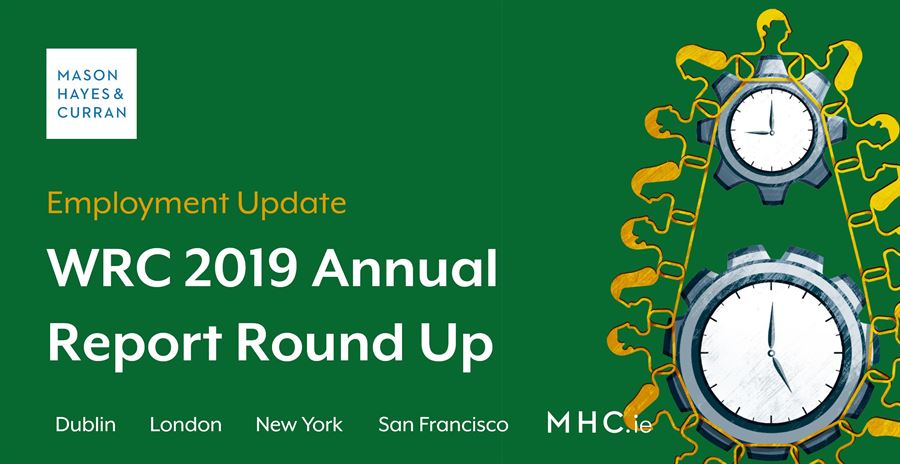
The Workplace Relations Commission Annual Report provides useful insights into the activities of the WRC and the numbers of complaints received in 2019.
WRC developments
The Report highlights several positive developments by the WRC. For 2019, these include a new regionalised office in Ennis which serves users in the WRC Mid-West region and a new website which is intended to be more interactive and process-oriented. The new website, introduced in May last year, is a welcome change for practitioners in particular, and will be subject to a review by user groups and stakeholders later this year. The WRC is also in the process of building out a new web-based, user friendly complaint form during 2020.
Complaint trends
The Report sets out in detail the numbers of complaints lodged throughout the course of 2019. 8,309 complaint applications were received by the WRC in 2019, each application included one or more individual complaints under various pieces of employment legislation, which meant a total of 20,939 separate individual complaints, or 2.5 on average per complaint application.
This represented a 36% increase from 2018 and a near 50% increase from 2017. The Report does note that the spike in complaints is mainly accounted for by working time complaints submitted on behalf of Retained Fire Fighters[1], and other specific complaints such as complaints relating to pay for Hospital Consultants.
![]() 2019 complaints were largely broken down into the following categories:
2019 complaints were largely broken down into the following categories:
-
Hours of work issues (30%)
-
Pay issues (25%)
-
Unfair dismissals (10%)
-
Discrimination/equality issues (9%)
-
Terms of employment (7%)
-
Trade disputes/IR issues (6%)
Hours of work were by far the most common complaint submitted in 2019, with 6,266 complaints lodged in total. This is over three times the number of complaints of this type received by the WRC in each of the previous two years and now represents the highest complaint type (previously complaints relating to pay were the most prevalent). The Report notes however that this complaint category reflects the nature of the complaints submitted during the above mentioned “spike”.
Conversely, there is a noticeable decrease in equal status complaints lodged with the WRC. In 2019, 648 Equal Status claims were lodged, a 25% decrease from 2018. Other equality and discrimination complaints were down 14% on 2018 figures. Unfair dismissal claims remained largely comparable to 2018 figures, with 2,166 complaints lodged in 2019.
The Report notes a sizeable increase in recovery of unpaid wages by the WRC. €3.9m was recovered in unpaid wages in 2019, representing an increase of 20% on the 2018 figure.
Mediation and hearings
Mediation
Parties to a complaint may be offered the option of mediation where the WRC believes the case is suitable and where both parties are agreeable to the use of mediation. The WRC offers in person and telephone mediation. Of 2,000 cases where intervention was offered, mediation occurred in 1,024. Of those, about 25% were in person. Of the total number of cases proceeding to mediation, 45% were diverted away from adjudication. The WRC continues to actively promote mediation.
Adjudication hearings
The Report outlines that roughly the same amount of adjudication hearings took place in 2019 when compared to the previous year, and notes that the numbers reflect an improved linking of related cases which reduces the numbers of hearings required.
Postponements
There was a new dedicated postponement email address introduced at the end of 2019 for postponement applications. The Report notes that this allows for postponement applications to be dealt with promptly. The WRC reports that it is also rolling out a new pilot postponement project and guidelines later in 2020, in an attempt further improve the handling of postponement requests.
Timeframe for decisions
The median time that decisions issued in 2019 was 230 calendar days from the date the complaint is received to the decision issuing. This marks a 51 calendar day improvement on 2018, and a vast improvement on the total waiting time that existed when the WRC was first established in 2015.
Workplace inspections and employer prosecutions
The WRC carried out 4,804 workplace inspections in 2019, a 16% decrease from 2018. 60% of the inspections that were carried out were unannounced.
The number of fixed payment and compliance notices issued in 2019 decreased when compared to 2018 figures:
-
12 fixed payment notices were issued in 2019 compared to 21 fixed payment notices in 2018, and
-
52 compliance notices were issued in 2019 compared to 120 compliance notices in 2018
125 employers were convicted in summary proceedings in the District Court in 2019, close to a 100% increase on 2018 figures. Employers may have summary proceedings brought against them for failure to comply with a statutory obligation, for example employment permit or working time breaches.
Conclusion
The Workplace Relations Commission continues to play a pivotal role in Ireland’s employment law and industrial relations landscape. The 2019 report reflects the ongoing efforts of the Commission to adapt and improve its services for the benefit of all service users. The information contained in it also reflects the experience of employees and employers and the issues that bring them into conflict, some of which change from year to year to reflect trends in our society and economy. The impact of COVID-19 will make for interesting reading in the 2020 report.
For more information, contact a member of our Employment & Benefits team.
The content of this article is provided for information purposes only and does not constitute legal or other advice.
[1] In 2019 400 individual retained firefighters made working time complaints against their local authority employers. Retained firefighters are on call 24 hours per day and are required to live within a certain response time of the station. The officers claimed that time spent on call was in fact working time, making complaints in respect of alleged breaches of various working time provisions. Adjudication officers have found that on-call periods cannot be classified as “working time”.





